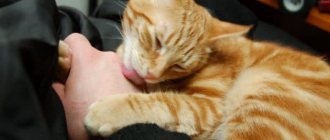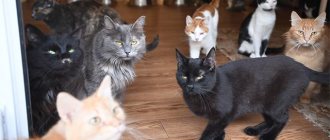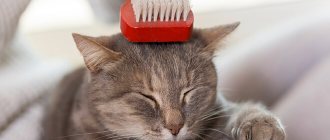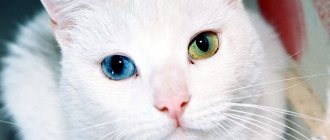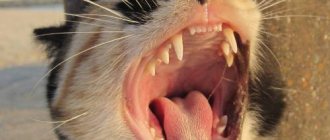Cats have a strong maternal instinct. Immediately after birth, they begin to take care of their offspring, provide newborns with proper care, and in every possible way protect their babies from external irritants. However, there are sad cases when a cat “forgets” about its responsibilities. Often, an unusual situation resolves itself, but sometimes the owner’s help is required to prevent possible negative consequences in the pet family.
Immediately after birth
Mother cats tend to look for cozy and quiet places to give birth. But if desired, the owner can create it for her pet. For example, you could line a box with towels and place it all in a quiet, dark room.
After the birth of children, if the cat is unable to do anything, the owner needs to:
- remove amniotic sacs (water membranes) from around their faces and bodies;
- Wipe the mouth and nose with a soft cloth and make sure that the kitten begins to scream or breathe;
- get rid of the remnants of the membrane from the body of newborn kittens;
- cut the umbilical cord. To do this you need a clamp and clean scissors. The distance for cutting is 2 cm from the abdomen.
Care from the first days
The cat begins to care for the offspring immediately after it is born:
- She eats the amniotic sac, freeing the kittens from the membrane.
- Mommy immediately starts licking the babies. Initially, this procedure is aimed at eliminating the remaining amniotic tissue and fluids. It stimulates the breathing reflex, which is triggered after cleaning the nose and mouth.
- Later, the cat massages the babies’ bellies with its tongue, which makes their digestive and excretory systems work.
- On the first day, cleaning up feces also falls on the mother, and she licks off the excretions of her kittens. She usually stops doing this after introducing complementary foods.
First few weeks
The first time after birth, kittens see and hear poorly, so they have to live by their instincts. They smell milk and reach out to their mother to feed on it.
If more kittens were born than the mother has nipples, then the owner needs to swap some of the cubs herself so that everyone can taste the mother’s milk.
As for grooming, mom licks the belly and anus, making them want to go small and big. If the kittens do not have a mother, then the person should take care of this issue on their own by stroking those places with a warm and damp washcloth.
Rules for caring for a pet
A kitten that settles in the house needs not only good nutrition, it also needs affection and proper care. New parents should be able to:
- Trim your pet's nails. There are special scissors for this. Before the procedure, it is necessary to carefully study the structure of the claw. If your dog’s claws are white, then if you look closely at them, you will notice a pinkish part closer to the paws. If you hit it when trimming, you can cause pain to the kitten. Therefore, you should trim the claws carefully, without touching the pink part (supplied with nerve endings). It is quite difficult to notice a painful area on black claws, so it is enough to trim no more than 1 mm of the claw.
- Clean the ears. This procedure is very important. When cleaning, not only dirt is removed, but also the condition of the ears is checked. If dark discharge appears in them, similar to pieces of earth, accompanied by an unpleasant odor, it means that the pet has become infected with ear mites. If you suspect a disease, you must visit a veterinarian and instill special ear medications to fight tick-borne infection.
- Bathe your pet. The frequency of bathing depends on the breed and the degree of soiling. This is often not recommended. It is better to carry out this procedure as needed.
- Brush your teeth. They do this periodically, without trying too hard, so as not to scare the cat. First, the animal is accustomed to cleaning the front incisors, then they move on to the teeth located in the depths of the mouth. The teeth brushing procedure lasts a maximum of 30 seconds.
- Brushing the kitten. If there is fur, comb the animal regularly, at least 2 times a week.
- Cleanse your eyes. For the procedure, boiled water, chamomile decoction, a weak solution of manganese, boric acid solution, saline solution, and strong tea leaves are used. Use a sterile bandage to wash your eyes. Cotton pads or cotton wool are not recommended, as lint can get into the eye and cause discomfort. A sterile piece of bandage, folded several times, is moistened in a warm solution of any of the above agents and each eye is treated separately. Move from the outer corners of the eye towards the nose. A piece of bandage used once is thrown away, and a new piece is taken to continue the procedure.
First movements
About three weeks after birth, it is time for socialization, when the offspring begins to independently explore the environment. This is when the mother begins to encourage curiosity. However, she still worries, so you can hear a rather strange sound from her when she calls out to those who have wandered too far.
By four weeks, kittens should be fairly stable on their feet. Then their mother begins to wean them off milk. By six weeks they will begin to play, jump and climb.
Many experts recommend exposing kittens to people between four and six weeks. You need to pet them gently and calmly enough so that they get used to your touch.
How to arrange care
You need to care for a small kitten just like you would a child. Some kittens are toilet trained by the breeder, but this task is often assigned to the new owner. You need to introduce your baby to the litter box from the first day of his stay in the house. In case of incidents, you should not shout, raise your voice or hit your pet.
Particular attention should be paid to the hygiene and cleanliness of the animal. Don't forget about caring for your pet's oral cavity
The specific environment of the oral cavity is a high-risk area; with incorrect hygiene, plaque begins to appear, which is considered a favorable environment for many bacteria. At first, you can clean the kitten’s mouth with a cotton wool soaked in boiled water, collecting leftover food. Over time, you will need a complete set for caring for your pet’s oral cavity: a toothbrush and toothpaste.
Don't forget about caring for your pet's oral cavity. The specific environment of the oral cavity is a high-risk area; with incorrect hygiene, plaque begins to appear, which is considered a favorable environment for many bacteria. At first, you can clean the kitten’s mouth with a cotton wool soaked in boiled water, collecting leftover food. Over time, you will need a complete set for caring for your pet’s oral cavity: a toothbrush and toothpaste.
Maternal aggression
Don't worry if your cute kitty turns into a snarling tigress after giving birth. This is completely normal behavior, since the reason for this is increased hormonal levels.
If you try to interact with a pet or its litter, you may encounter an unpleasant hiss.
The animals need to be in a protected environment so that the mother cat can do her job of raising the kittens without struggling with feelings of aggression.
Do cats miss their kittens?
Contents hide
Do cats miss their kittens?
Many cat owners describe something similar. Especially those who, by hook or by crook, are accustomed to “getting rid of” unwanted offspring. Let's leave aside the ethical side of the issue; someday we will talk about this too. Or another, more typical situation: sooner or later, grown-up kittens are placed in “good hands.” The cat's behavior often changes; she begins to feel sad, rush about, and desperately look for her babies. Let's think: is the cat really worried or are we, as always, thinking of something, endowing our pets with non-existent human qualities?
The first weeks of life. Kittens, as soon as they are born, are completely dependent on their mother. As you know, they are born completely blind and can’t do anything. Therefore, the first lessons of survival in our big world are taught to them by their mother cat! She also teaches children hygiene and self-care skills. But kittens grow up very quickly and begin to live their own lives. And this happens many orders of magnitude faster than with us humans. Some of our “offspring” are essentially children even at twenty years old!
But let's return to kittens: at the age of three weeks, a kitten is already beginning to actively explore the world around it. At four weeks, the kitten receives its first hunting lessons - it learns to get its own food. At about the same age (or a little later), the kitten tries solid food for the first time.
The beginning of adult life. At the age of 10-12 weeks, kittens can no longer be called foolish babies: they are ready to find their new home and start living independently. This, however, is what happens: the kittens are housed by this time. How does a cat's behavior change? Many owners notice that their pets look confused and meow pitifully, looking for their grown and “fledged” babies. The picture is more than sad... But there is good news: the cat usually grieves for a couple of days, sometimes a little more, and then returns to “normal” life.
Let's not blame the mother cat for being too callous. There is already something of us, human, in this. From the point of view of the animal world, everything is absolutely normal and natural. And it is also natural that cats do not feel any melancholy towards their kittens, given into “strange” hands.
Do cats recognize their matured cubs after some time? Here's another interesting fact: what happens if an adult offspring is brought back together with its natural mother? Will animals be imbued with related feelings? Alas and ah: they will not be imbued with it. When a mother and her babies live together, in one box, they are united by a common unique aroma. When the “kids” go to different houses, the “common” smell quickly disappears. So, if you suddenly decide to take your pet to the “parent’s house”, then he will experience nothing but stress: strange, unfamiliar smells await him. And a completely alien cat, even though it’s her own mother!
For sentimental people, this is rather sad news. No intensity of passions, reunited families... Let's leave these dramas to the scriptwriters of television series for housewives. And every cloud has a silver lining: the cat quickly recovers from the consequences of “mental trauma” and simply enjoys life with its owners, in its own home.
Photo: pixabay.com
